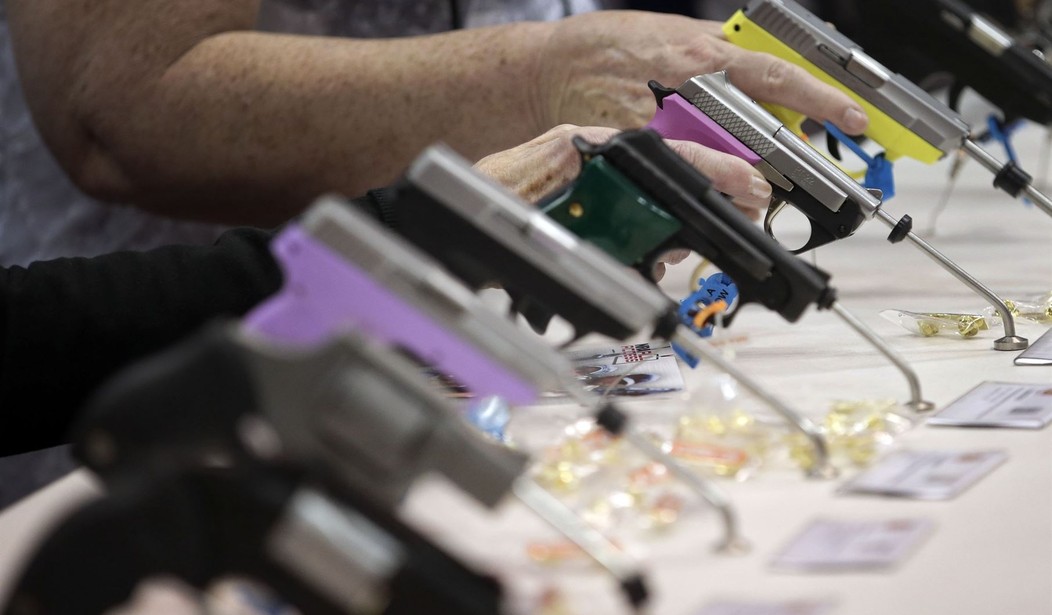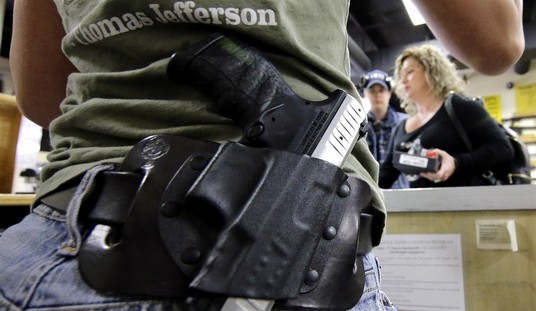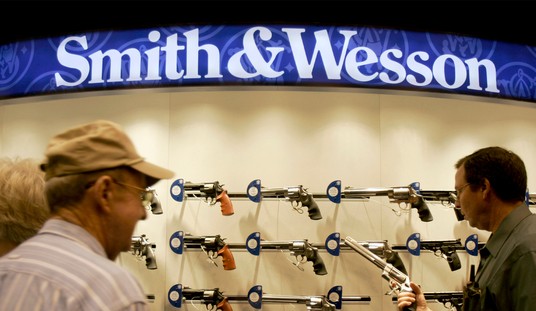Gun control supporters really aren’t doing a good job of coping with the Supreme Court’s decision in New York State Rifle & Pistol Association v. Bruen. Not only have we seen a number of blue states defiantly respond to the Court by adopting new laws that will almost certainly be declared unconstitutional, they’re struggling mightily to come up with legal arguments that might convince the Court to uphold some of their most treasured restrictions on the right to keep and bear arms.
One of the more interesting (though not convincing) arguments I’ve seen made since Bruen was handed down came from attorney Kirk Jenkins, who believes that the Thirteenth Amendment is a useful vehicle for gun control activists going forward… because, in his view, the only reason the Second Amendment came into existence was to promote the continuation of chattel slavery.
Properly interpreted as constitutionalizing the slave-holding South’s ability to arm its slave patrols brings the Second Amendment squarely into conflict with the Thirteenth Amendment.
The Supreme Court has held that the Thirteenth Amendment extends beyond merely abolishing slavery and involuntary servitude to giving Congress power to sweep away its badges and incidents as well: power that Congress used in enacting the Civil Rights Act.
But is Congress empowered to decide what the badges and incidents of slavery are, or is that task assigned exclusively to the courts? The answer is yes: subject only to a test of rationality, Congress has the power to define the badges or incidents of slavery and enact legislation to address those practices.
Sen. Lyman Trumbull was clear: “the second section declares that Congress shall have authority by appropriate legislation to carry this provision into effect. What that ‘appropriate legislation’ is, is for Congress to determine, and nobody else.” Rep. Burton Cook agreed during the debate over the Civil Rights Act, saying that Section Two “meant … that Congress should be the judge of what is necessary for the purpose of securing to [the former slaves] those rights.”
Although for the first century following ratification the Supreme Court held that certain discriminatory practices could not rationally be found to be badges and incidents, the court has never questioned that Congress has the power to determine what the badges and incidents of slavery are.
It’s a creative approach, but it falls apart upon the slightest application of historical scrutiny. First, there was plenty of support for the individual right to keep and bear arms in northern states, despite the relative scarcity of slavery within their borders. In Federalist 46, Virginian James Madison made an explicit argument in favor of ratifying the Constitution by pointing out that the people, with their right to bear arms, would serve as a check on federal tyranny, not a slave uprising. Federalist 46 predates the ratification of the Constitution, much less the Bill of Rights, and clearly spoke of a non-racist motivation behind ensuring that right of the people to keep and bear arms would not be infringed if the Constitution was adopted as a replacement to the Articles of Confederation.
Shortly after the Thirteenth Amendment was ratified, the Fourteenth Amendment was adopted by Congress and the states as well, and during the congressional debates over the protections afforded to newly-freed slaves, it’s clear that Congress intended to protect their right to keep and bear arms in self-defense.
Deprivations of freed slaves’ Second Amendment rights featured in debates over bills leading to enactment of the Freedmen’s Bureau Act and the Civil Rights Act of 1866. Rep. Thomas Eliot, sponsor of the former, explained that the bill would render void laws like that of Opelousas, Louisiana, providing that no freedman “shall be allowed to carry fire-arms” without permission of his employer and approval by the board of police. He noted that in Kentucky “[t]he civil law prohibits the colored man from bearing arms . . . .”
Accordingly, the Freedmen’s Bureau bill guaranteed the right of freedmen and all other persons “to have full and equal benefit of all laws and proceedings for the security of person and estate, including the constitutional right to bear arms.”
Senator Garrett Davis said that the Founding Fathers “were for every man bearing his arms about him and keeping them in his house, his castle, for his own defense.”
Many of those members of Congress who voted to ratify the Thirteenth Amendment were around for the debate and ultimate vote to ratify the Fourteenth Amendment as well, and if they viewed the Second Amendment as a stain on the soul of the nation that needed to be repealed in the name of abolishing badges of slavery they could have.
They did not. Instead, they chose to ensure that all law-abiding Americans, including freed slaves, possessed the right to use arms in defense of themselves, their families, and their communities. Today, black women are the fastest growing demographic of new gun owners; a badge of freedom and the individual right of self-defense, not slavery or subjection to violent actors.
That’s reason enough for the courts to reject Jenkins’ approach, but his biggest problem is going to be convincing the Supreme Court that it got it wrong in Heller, McDonald, and now Bruen.
Heller was wrongly decided. The Second Amendment would never have been ratified if the slave state ratifiers had been told that it protected an individual right of all persons, including free African Americans, to stockpile and carry concealed weapons in public. Properly understood as guaranteeing Southern states their “right” to organize and arm slave patrols, the Second Amendment was a fundamental pillar of the slave system—every bit as essential as the infamous slave codes and Reconstruction-era Black Codes. As such, the Second Amendment is an incident of slavery that the Thirteenth Amendment gives Congress the power to regulate.
The problem with Jenkins’ argument is that it places more importance on an assumption of what the Founders would have done rather than the reality of what they did do. You could also make the argument that the First Amendment never would have been ratified is slave state ratifiers had been told that it would one day protect the sending of abolitionist pamphlets through the mails to southern states, or that it would one day protect an individual right of all people, including free African Americans, to advocate for the freedom of those who continued to be held in bondage.
But the First and Second Amendments weren’t rejected by the Founders. They were added in to the Constitution because, in the words of the Bill of Rights’ preamble, “The Conventions of a number of the States, having at the time of their adopting the Constitution, expressed a desire, in order to prevent misconstruction or abuse of its powers, that further declaratory and restrictive clauses should be added.”
Jenkins’s entire argument is a misconstruction and abuse of the Constitution’s powers, but that’s pretty much the only legal argument the gun control lobby has left; the Supreme Court got it wrong, and everything it’s said to date about the right to keep and bear arms should be disregarded. That might make them feel better about themselves, but it’s not going to carry the day at the Supreme Court.









